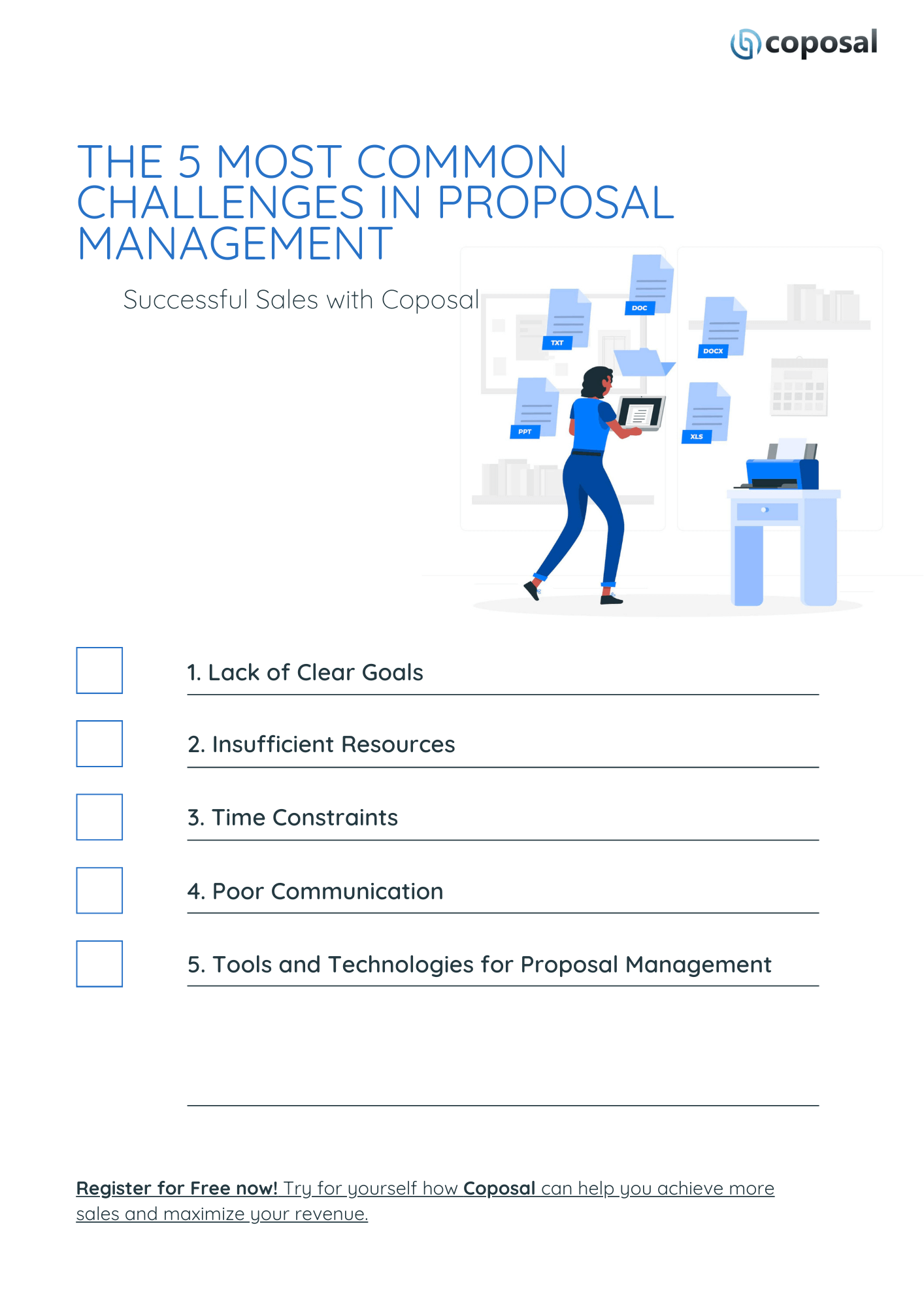 In the field of project management, proposal management is a critical phase. It is the gateway to securing projects, partnerships, and funding, involving the coordination of different teams, resources, and strategies to create successful proposals.
In the field of project management, proposal management is a critical phase. It is the gateway to securing projects, partnerships, and funding, involving the coordination of different teams, resources, and strategies to create successful proposals.
However, navigating through proposal management is not always a walk in the park. Various challenges can slow down the process and hinder success.
Understanding these challenges is crucial for developing effective strategies to overcome them.
This guide sheds light on the most common challenges and provides actionable insights to master them.
Table of Contents
1. Lack of Clear Goals
 One of the biggest challenges in proposal management is the lack of clear goals.
One of the biggest challenges in proposal management is the lack of clear goals.
Without a clear understanding of what the proposal aims to achieve, teams may struggle to effectively align their efforts and resources.
This can lead to confusion, scope creep, and ultimately a poorly structured proposal that does not adequately address the client's requirements.
Our Proposal:
To overcome this challenge, it is important to establish clear goals from the outset. This includes
- thoroughly researching customer needs
- defining specific goals for the proposal
- clear communication to all team members involved
Regular checkpoints and feedback sessions can help ensure that the proposal remains aligned with the goals throughout the process.
2. Insufficient Resources
 Another common challenge in proposal management is the lack of adequate resources. This can include personnel, budget, technology, or expertise needed to develop a high-quality proposal within the given timeframe.
Another common challenge in proposal management is the lack of adequate resources. This can include personnel, budget, technology, or expertise needed to develop a high-quality proposal within the given timeframe.
Insufficient resources can lead to overburdened teams, compromised quality, and missed deadlines.
How to Allocate Sufficient Resources
To address this challenge, companies need to invest in the necessary resources for proposal management.
This may include hiring additional staff, providing training and development opportunities, investing in technology and tools, or outsourcing certain tasks to specialized agencies.
By ensuring teams have access to the required resources, companies can improve the efficiency and effectiveness of their proposal management process.
3. Time Constraints
 Time constraints pose a major challenge in proposal management, especially when deadlines are tight and multiple proposals need to be submitted simultaneously.
Time constraints pose a major challenge in proposal management, especially when deadlines are tight and multiple proposals need to be submitted simultaneously.
Limited time can lead to rushed decisions, incomplete research, and a lack of attention to detail, all of which can impact the quality and success of the proposal.
Implementing Time Management Strategies
To mitigate the effects of time constraints, implementing effective time management strategies is essential.
This can include breaking down the proposal into smaller, manageable tasks, prioritizing activities based on their importance and urgency, and using tools and techniques such as Gantt charts or agile methods to track progress and allocate time effectively.
4. Poor Communication
 Communication breakdowns can lead to significant challenges in proposal management, especially in large, distributed teams where members may work remotely or across different time zones.
Communication breakdowns can lead to significant challenges in proposal management, especially in large, distributed teams where members may work remotely or across different time zones.
Poor communication can result in misunderstandings, delays in decision-making, and lack of coordination, ultimately affecting the quality and timeliness of the proposal.
Effectively Utilizing Communication Channels
To overcome this challenge, companies need to establish clear communication channels and protocols for proposal management.
This may include regular team meetings, virtual collaboration platforms, project management tools, and documentation repositories to ensure information is transparently and efficiently exchanged throughout the team.
5. Tools and Technologies for Proposal Management
In today's digital age, a wide range of tools and technologies are available to optimize the proposal management process and address common challenges.
These include:
- Proposal management software: Specialized software solutions designed to streamline the entire proposal lifecycle, from initial planning and drafting to final submission and tracking.
- Collaboration platforms: Online platforms like Microsoft Teams, Slack, or Google Workspace that enable teams to communicate in real-time, collaborate, and share documents.
- Time tracking tools: Tools like Toggl or Harvest that allow teams to track the time spent on various proposal-related activities, helping identify bottlenecks and improve efficiency.
Summary
Addressing the complexity of proposal management requires a blend of strategic planning, effective communication, and adaptability.
By understanding and tackling common challenges in proposal management, companies can streamline workflows, increase productivity, and enhance the quality of proposals.
Embrace innovation, foster collaboration, and prioritize stakeholder engagement to overcome challenges and succeed in proposal management.
 Reading Tip: If our article has been helpful and you want to learn more about proposal management, continue reading here: "The Role of Proposals in Conversion Optimization"
Reading Tip: If our article has been helpful and you want to learn more about proposal management, continue reading here: "The Role of Proposals in Conversion Optimization"
Frequently Asked Questions About Challenges in Proposal Management
What is proposal management?
Proposal management involves coordinating different teams, resources, and strategies to create successful proposals for contracts, projects, or grants.
Why is proposal management important?
Effective proposal management is crucial for organizations to win contracts, projects, or grants that are essential for their growth and success.
How can the lack of clear goals impact proposal management?
The lack of clear goals can lead to confusion, scope creep, and ultimately a poorly structured proposal that does not adequately address the client's requirements.
What effective communication channels are there for proposal management?
Effective communication channels for proposal management include regular team meetings, virtual collaboration platforms, project management tools, and documentation repositories.
Can proposal management software help address challenges?
Yes, proposal management software can streamline the proposal lifecycle, improve collaboration among team members, and help track progress and deadlines, thus addressing common challenges in proposal management.